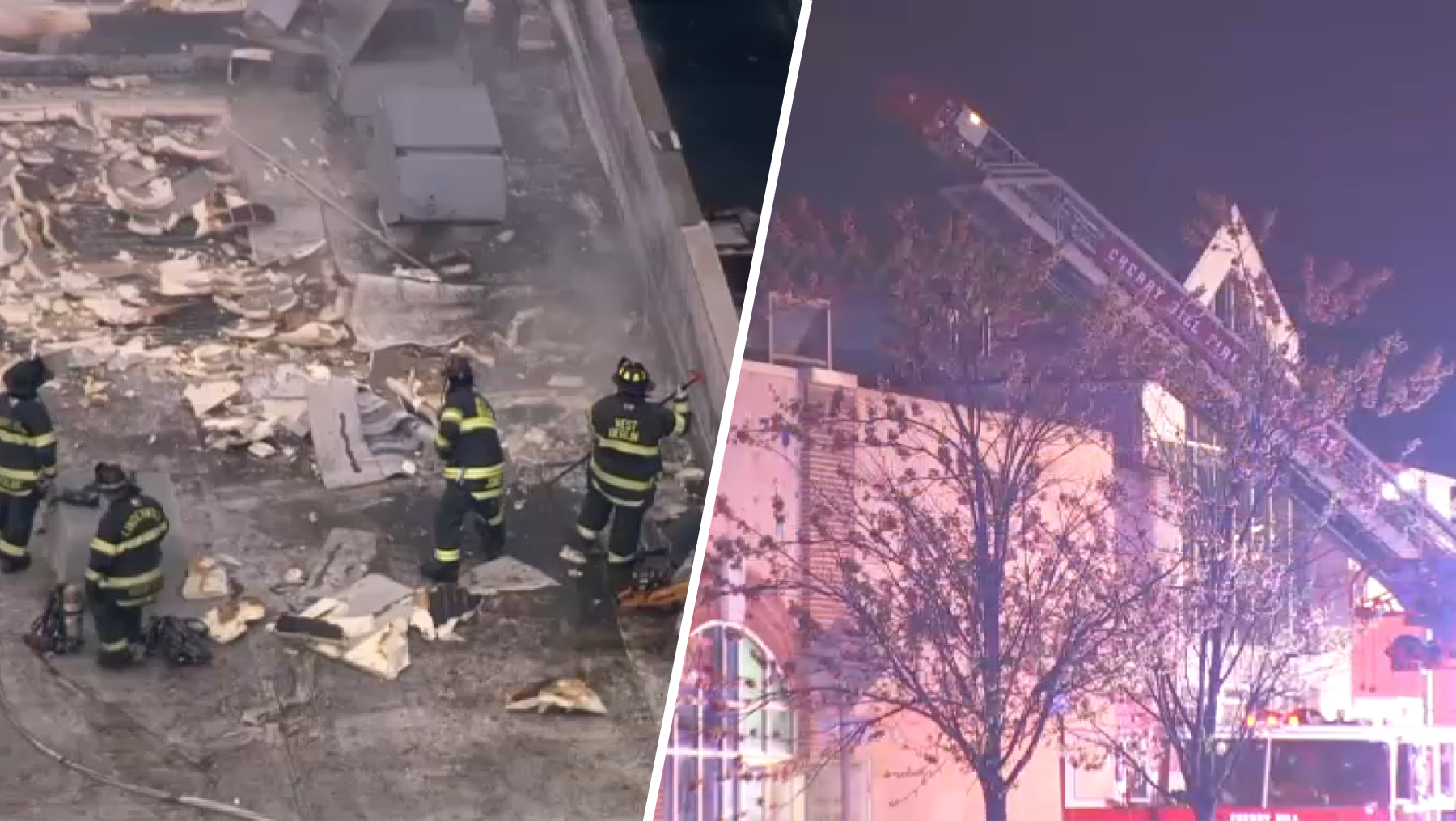What to Know
- A massive fire caused a series of explosions at a South Philadelphia oil refinery June 21.
- It took several days for officials to extinguish the fire, but questions remain over how caused it and how extensive the damage is.
- Philadelphia Energy Solutions announced that the refinery would go up for sale within the next month.
Residents all over the region were woken up early on the morning of June 21, 2019 after a series of explosions at the Philadelphia Energy Solutions refinery sent massive flames and thick smoke billowing into the air.
The fire raged for days. After the inferno went out, the questions started trickling in: What happens next? Will the plant close? What about the people who work there?
NBC10 compiled all the information we have as of Thursday afternoon. This story will be updated as more details become available.
What happened?
A blaze erupted shortly after 4 a.m. on June 21 at the PES refinery near the Philadelphia International Airport. City emergency management sounded early warning sirens at 5:30 a.m. and issued a shelter-in-place for the area immediately around the complex. It was later lifted.
It set off three explosions felt miles away as the fire plowed through a tangle of pipes carrying fuel across the complex, the company said. It happened at the Girard Point refinery, one of two at the PES complex in South Philadelphia.
Local
Breaking news and the stories that matter to your neighborhood.
The fire erupted in a tank containing a mixture of butane and propane, a Philadelphia fire official said.
The facility employs a private fire brigade that took on the primary firefighting responsiblities. City firefighters assisted in the fire fight.
Five people were injured — one person suffered a non-fire related emergency — but all were treated in the PES complex clinic.
Investigators haven't been able to go to some areas at the complex because they haven't yet been assessed by a structural engineer, according to the city fire commissioner's office.
Last week’s fire comes nearly two weeks after another incident at the same complex. On June 10, a small fire broke out at the facility. No one was hurt. Another fire broke out at the complex in 2015.
What happens next?
Philadelphia Energy Solutions announced Wednesday its plan to put the refinery for sale later this summer. The news triggered concerns over 1,000-plus jobs that will be lost as a result of the plant’s closure. In a statement, PES said Friday’s explosions made it “impossible” to continue operations.
United Steelworkers, which represents the refinery workers, is investigating whether the company had insurance coverage for a destroyed alkylation unit, Ryan O'Callaghan, the president of Local 10-1, told The Philadelphia Inquirer. It would push the company to rebuild the unit, he said.
"It appears they're cashing the check and heading for the doors," he said.
The future of the site remains in limbo as investigators from multiple federal agencies work to understand what caused the explosions, the extent of damage and what effects the incident had on the integrity of the plant. It is too soon to determine if the PES campus can be redeveloped into anything other than an industrial complex.
Who will buy the plant? What it could become?
That is one of the biggest unanswered questions.
U.S. Sen. Pat Toomey said in a statement that his office was in touch with company officials and that he hopes that an alternative will emerge in coming weeks to prevent the refinery from closing permanently.
But the company has shown a declining cash balance in the six months through March while its long-term debt grew, according to reports the company files in U.S. Bankruptcy Court in Delaware.
One of the considerations for next steps would be the results of pending investigations. Currently, four federal agencies are looking into what set off the explosions, including the EPA, OSHA and ATF.
The Chemical Safety Board, a non-regulatory agency, said Thursday that it has not been able to enter the area because conditions remain "unstable," according to CSB Interim Executive Dr. Kristen Kulinowski.
It could take several months before experts fully assess the damage and any environmental effects that could impact the future of the site.
I work at the plant? What will happen to my job?
Philadelphia Energy Solutions is pursuing opportunities to restart the complex but cannot give any guarantees and, as a result, "all layoffs are expected to be permanent," the company said.
The Department of Labor and Industry activated its Rapid Response Coordination Services to assist PES employees, Pennsylvania Gov. Tom Wolf said Wednesday. The team will connect workers with unemployment insurance, training programs, job search activities and other social service programs.
Philadelphia Mayor Jim Kenney also said Wednesday that Philadelphia officials will convene a group of "quasi-governmental organizations" to look at the economic repercussions of shutting down the refinery.
"The City is committed to supporting them during this difficult time in any way possible," Kenney said.
PES employees can check the services available to them by visiting www.phila.gov/support.
I live in the neighborhood. What can I expect?
That is currently a major question, and concern, for both neighboring residents and city leaders.
Dr. Caroline Johnson said Health Department staff have been conducting "very aggressive" air quality monitoring in neighborhoods surrounding Philadelphia Energy Solutions' Girard Point refinery since Friday morning.
Staff have been testing for several hazardous compounds, including hydrogen peroxide, carbon monoxide and hydrogen fluoride. Johnson said all tests have come back negative.
What is the Philadelphia Energy Solutions refinery?
The commercial refining complex, which came out of bankruptcy last August, is the largest refinery on the East Coast and employs about 1,000 people. Many Philadelphians still call it the Sunoco refinery, though it is now owned by Philadelphia Energy Solutions, a partnership that includes Sunoco. The Carlyle Group owns 10% of the facility and Energy Transfer Partner has an 8% stake, sources told CNBC.
The refinery processes 335,000 barrels of crude oil every day at two plants in the complex — Girard Point and Point Breeze. The fire broke out at the Girard Point portion. Gasoline, diesel, jet fuel and petrochemicals are also produced at the plant.
The refinery dates back to the 19th Century, opening a year after the Civil War ended. It is considered the largest single source of particulate pollution in the region.
By declaring bankruptcy in 2018, PES was able to avoid complying with Clean Air Act renewable fuel standard obligations, which were estimated to cost some $350 million.
The company emerged from federal bankruptcy court last year after restructuring its debt, leaving its majority ownership in the hands of investment banking firms Credit Suisse Asset Management and Bardin Hill.
PES owes the state $3.8 billion in taxes and an additional $232,042 to the City of Philadelphia, according to court records.
Will gas prices be affected?
Gasoline futures prices spiked Tuesday night after the first news of the refinery's possible closure, and prices remained high Wednesday, according to the markets research company FactSet.
Motorists in the Mid-Atlantic region will likely see modest price increases as more summer travelers hit the road, AAA spokeswoman Jana Tidwell said in a statement.
The refinery has been an important source fueling transportation in the region, far from Gulf Coast refineries, and "at least temporarily, it's going to require some logistical shifting that could come at a cost," said Kevin Book, managing director at Clearview Energy Partners.
But while the amount of gasoline that will be lost from the refinery is sizable, it can easily be made up by imports from Europe or elsewhere, said Jonathan Aronson, a research analyst at Cornerstone Macro.
"We're not expecting any major shocks to retail gasoline (prices)," Aronson said. Consumers are more likely to feel gasoline prices increase due to the price of crude oil, which has been rallying in recent days, he said.



